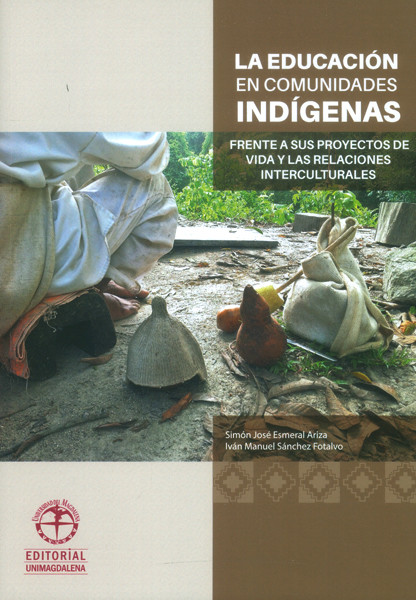
- Edición: 1
- Año de edición: {{getMes(14-1)}} de 2016
- No. de páginas: 136
- Formato: Impreso
- Idioma: Español
- ISBN Impreso: 9789587460780
La educación en comunidades indígenas frente a sus proyectos de vida y las relaciones interculturales
View title and subtitle in English
Title in English: Education in indigenous communities regarding their life projects and intercultural relations
CAPÍTULO 1. REALIDADES SOCIALES Y CULTURALES DE LAS COMUNIDADES INDÍGENASEL ORIGEN DE LA TIERRA CAPÍTULO 2. ACERCAMIENTO A SUS REALIDADES SOCIO-COMUNITARIAS Y CONVIVENCIALES CAPÍTULO 3. PRINCIPIOS CONSTITUCIONALES Y LE~LES PARA LA EDUCACIÓN EN COMUNIDADES CULTURALMENTE DIFERENCIADAS CAPÍTULO 4: PROCESOS EDUCATIVOS EN EL CONTEXTO NACIONAL CAPÍTULO 5: REFERENTES DE LA EDUCACIÓN EN COMUNIDADES INDÍGENAS: IDENTIDAD, AUTONOMÍA, TERRITORIALIDAD, SENTIMIENTO DE PERTENENCIA, MULTICULTURALIDAD-INTERCULTURALIDAD E INCLUSIÓN SOCIAL CAPÍTULO 6. PROCESOS EDUCATIVOS EN LAS COMUNIDADES IKIU, KÁGGABA Y WIWA. DISTRITO DE SANTA MARTA CAPÍTULO 7. A MANERA DE CUMPLIMIENTOS NO CONCLUSIVOS CAPÍTULO 8 LIMITACIONES, PROSPECTIVAS Y DISCUSIONES LISTA DE REFERENCIAS
Description in English: Addressing the investigative work from the perspective of dialogism as a truly human action, that is, from the realities and communicative interactions of human groups supported by double reflexivity, has not been an easy task. However, it has allowed the approaches to be enriching both for the researcher and his support groups, as well as for the communities themselves as co-architects of this entire process.This book presents, as non-conclusive fulfillments, the aspirations raised during the enriching spaces and prolonged coexistence times which, from the reality experienced in the communities of Bunkwimake, Gotsezhi, and Mulkwakungui, have been called dialogic stays, recognizing in its construct the struggles and processes of vindication as a commitment to a dignified life for their own communities, evidencing in a specific way the increasingly need to work for an education that is supported in the locality and open to the challenges of intercultural relationships in which individuals and their groups experience complex adversities of a social, political, cultural, and economic nature from which they recreate their processes of construction of knowledge and knowledge from their own and particular lived realities.Proposing education from an approach situated in the face of the demands and expectations of indigenous communities is to respond in some way to their life plan, which cannot be understood as an end reached, but rather a path taken that opens spaces for discussion broad, sincere, and respectful about education in culturally diverse contexts, full of knowledge with particular forms and styles of exercising pedagogy and teaching in their contexts with content in accordance with their cultural legacy. Although it is true that the issues of intercultural education are not something new for the 21st century, it does imply being able to experience it from one's own realities, from one's way of community social life, to recognize and value it from one's own worldview, which guides and directs the thinking of people and all cycles of life, that is, knowing it, understanding it, and valuing it from the spiritual principles that guide daily activities, their philosophy of life and nature, expressed in their particular vision of the world, given that the education processes within indigenous communities are very particular, as many as there are the particularities of each population, given that they arise from the modes, contents, and experiential forms with which the social group constructs and recreates what can be called family and community pedagogies mediated by everyday life.View description in English
CAPÍTULO 1. REALIDADES SOCIALES Y CULTURALES DE LAS COMUNIDADES INDÍGENASEL ORIGEN DE LA TIERRA CAPÍTULO 2. ACERCAMIENTO A SUS REALIDADES SOCIO-COMUNITARIAS Y CONVIVENCIALES CAPÍTULO 3. PRINCIPIOS CONSTITUCIONALES Y LE~LES PARA LA EDUCACIÓN EN COMUNIDADES CULTURALMENTE DIFERENCIADAS CAPÍTULO 4: PROCESOS EDUCATIVOS EN EL CONTEXTO NACIONAL CAPÍTULO 5: REFERENTES DE LA EDUCACIÓN EN COMUNIDADES INDÍGENAS: IDENTIDAD, AUTONOMÍA, TERRITORIALIDAD, SENTIMIENTO DE PERTENENCIA, MULTICULTURALIDAD-INTERCULTURALIDAD E INCLUSIÓN SOCIAL CAPÍTULO 6. PROCESOS EDUCATIVOS EN LAS COMUNIDADES IKIU, KÁGGABA Y WIWA. DISTRITO DE SANTA MARTA CAPÍTULO 7. A MANERA DE CUMPLIMIENTOS NO CONCLUSIVOS CAPÍTULO 8 LIMITACIONES, PROSPECTIVAS Y DISCUSIONES LISTA DE REFERENCIAS
- OCDE (Área, Subárea y Disciplina) Ciencias sociales > Ciencias de la educación > Educación general (incluye capacitación, pedagogía)
- Colección y serie: Ciencias Sociales > Educación y pedagogía
- Categoría: Libro producto de investigación
- THEMA: Delito y criminología
- BISAC: CIENCIAS SOCIALES > Criminología
- DEWEY: Sociología y Antropología > Educación > Educación
- Edición: 1
- Año de edición: 2016
- ISBN impreso: 9789587460780
- DOI:
- No. de páginas: 136
- Medidas en cm (Alto, Ancho, Grosor): 24, 17, 1
- Idioma: Español

